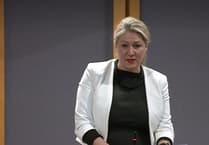CHANGES are set to be made to how Blaenau Gwent Council’s Planning Committee works, in a bid to get councillors and officers singing off the same hymn sheet.
At a meeting of the committee on Thursday, July 28, councillors were taken through a quarterly performance report for October to December 2021.
In two of the performance indicators which compared the percentage of applications decided within timescale and how many days it took, Blaenau Gwent compared favourably with the other 24 planning authorities in Wales.
They were praised by committee chairwoman, Cllr Lisa Winnett for coming in 10th and 11th in those tables that are published by the Welsh Government.
But on the final table, Blaenau Gwent occupied the 24th spot, as 80 per cent of planning decisions during that three-month period had been “contrary” to officer’s recommendations.
This was double the 40 per cent by Ceredigion County Council, in 23rd place, and well above the Wales average of 13 per cent.
The table showed Newport City Council in last and 25th place – but they had provided no data for comparison.
Planning development manager, Steve Smith said that his concern was a “trend” where the county borough is always in the “bottom two or three.”
Mr Smith said: “There will always be instances where there are legitimate reasons for members to disagree with officers on planning reasons
“But our concern as officers is that this is happening routinely, very often with no justifiable planning reasons.”
He explained that, when councillors refused an application, the developers could go through a planning appeals process to overturn a decision.
But planning applications that should have been refused but approved by councillors were a concern.
Mr Smith said that “sometimes identical types of schemes” would be decided differently leading to “unfairness, ” and meant that the council is “running an inconsistent service.”
Asking whether more training could be given, Cllr Jules Gardner said: “Do you think it’s a lack of education or knowledge on part of the members in the decision-making process?”
Mr Smith told the councillors that he is drafting a report on the functions of the planning committee.
He explained that councillors need to recognise that the planning committee is a “quasi-judicial” and is different to other council committees.
Mr Smith believed that too many minor planning applications – for example for home extensions, garages or one-plot houses – were being presented to committee for a decision, and that they should only be deciding the bigger applications.
Mr Smith added that in training sessions councillors should pay particular heed to the “material planning considerations” section.
Mr Smith: “Very often we’re taking decisions regardless of that.”
He added that many appeals during the last five years stemming from decisions made by councillors had been won by applicant, and this led to costs being awarded against the authority.
Cllr Winnett said: “I know we don’t always agree with what our officers have said in a planning report, but it can also knock their morale, affect their confidence and wellbeing.
“It does concern me how bad we are, we’re at the bottom of the table.”
Any changes may need to be discussed with the council’s legal department, and tweaks to the constitution may be needed.





Comments
This article has no comments yet. Be the first to leave a comment.